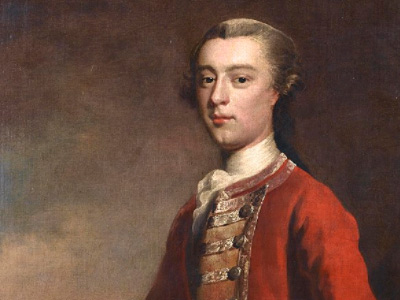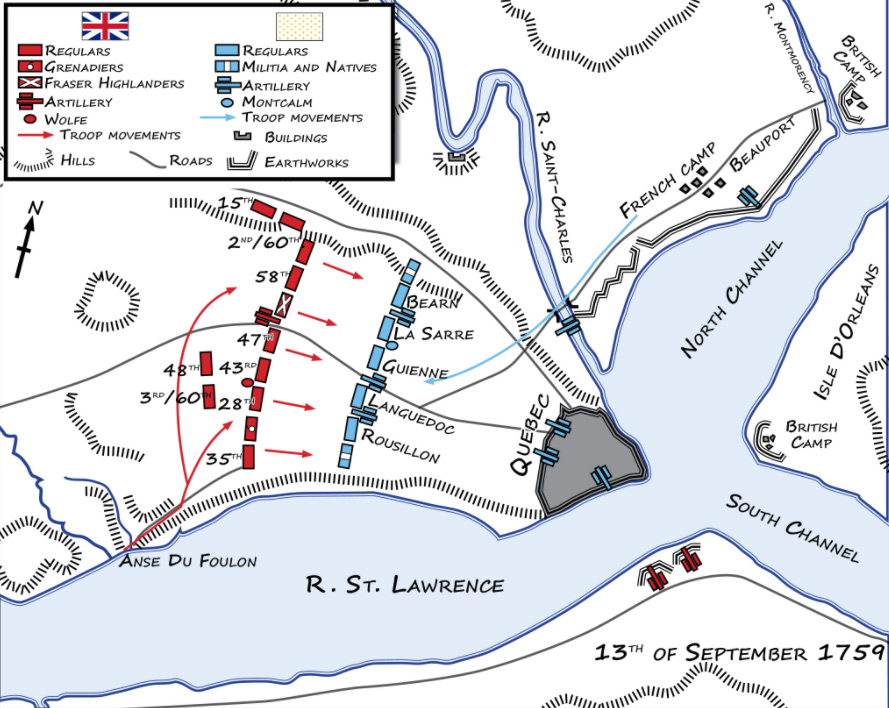James Wolfe (1727-1759)
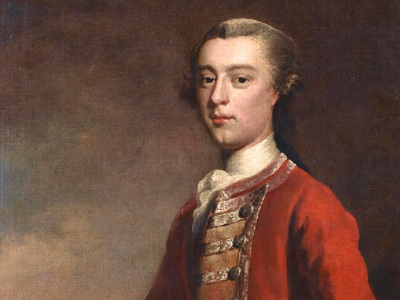
War of the Austrian Succession (1740–1748)
European War
In 1740 the War of the Austrian Succession broke out in Europe. Although initially Britain did not actively intervene, the presence of a sizable French army near the border of the Austrian Netherlands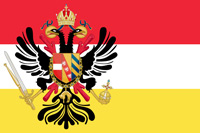 The Austrian Netherlands was the territory of the Burgundian Circle of the Holy Roman Empire between 1714 and 1797. The period began with the Austrian acquisition of the former Spanish Netherlands under the Treaty of Rastatt in 1714 and lasted until Revolutionary France annexed the territory during the aftermath of the Battle of Sprimont in 1794 and the Peace of Basel in 1795. compelled the British
The Austrian Netherlands was the territory of the Burgundian Circle of the Holy Roman Empire between 1714 and 1797. The period began with the Austrian acquisition of the former Spanish Netherlands under the Treaty of Rastatt in 1714 and lasted until Revolutionary France annexed the territory during the aftermath of the Battle of Sprimont in 1794 and the Peace of Basel in 1795. compelled the British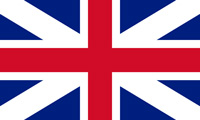 The Kingdom of Great Britain was a sovereign country in Western Europe from 1 May 1707 to the end of 31 December 1800. The state was created by the 1706 Treaty of Union and ratified by the Acts of Union 1707, which united the kingdoms of England (which included Wales) and Scotland to form a single kingdom encompassing the whole island of Great Britain and its outlying islands, with the exception of the Isle of Man and the Channel Islands. to send an expedition to help defend the territory of their Austrian ally in 1742. James Wolfe was given his first commission as a second lieutenant in his father's regiment of Marines in 1741. Early in the following year he transferred to the 12th Regiment of Foot, a British Army infantry regiment, and set sail for Flanders some months later where the British took up position in Ghent. Here, Wolfe was promoted to Lieutenant and made adjutant of his battalion. His first year on the continent was a frustrating one as, despite rumours of a British attack on Dunkirk, they remained inactive in Flanders.
The Kingdom of Great Britain was a sovereign country in Western Europe from 1 May 1707 to the end of 31 December 1800. The state was created by the 1706 Treaty of Union and ratified by the Acts of Union 1707, which united the kingdoms of England (which included Wales) and Scotland to form a single kingdom encompassing the whole island of Great Britain and its outlying islands, with the exception of the Isle of Man and the Channel Islands. to send an expedition to help defend the territory of their Austrian ally in 1742. James Wolfe was given his first commission as a second lieutenant in his father's regiment of Marines in 1741. Early in the following year he transferred to the 12th Regiment of Foot, a British Army infantry regiment, and set sail for Flanders some months later where the British took up position in Ghent. Here, Wolfe was promoted to Lieutenant and made adjutant of his battalion. His first year on the continent was a frustrating one as, despite rumours of a British attack on Dunkirk, they remained inactive in Flanders.
In 1743, he was joined by his younger brother, Edward, who had received a commission in the same regiment. That year the Wolfe brothers took part in an offensive launched by the British. Instead of moving southwards as expected, the British and their allies instead thrust eastwards into Southern Germany where they faced a large French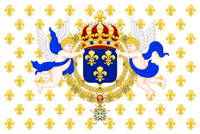 The Kingdom of France is the historiographical name or umbrella term given to various political entities of France in the medieval and early modern period. It was one of the most powerful states in Europe since the High Middle Ages. It was also an early colonial power, with possessions around the world. Colonial conflicts with Great Britain led to the loss of much of its North American holdings by 1763. The Kingdom of France adopted a written constitution in 1791, but the Kingdom was abolished a year later and replaced with the First French Republic. army. The army came under the personal command of George II but in June he appeared to have made a catastrophic mistake which left the Allies trapped against the River Main and surrounded by enemy forces in "a mousetrap".
The Kingdom of France is the historiographical name or umbrella term given to various political entities of France in the medieval and early modern period. It was one of the most powerful states in Europe since the High Middle Ages. It was also an early colonial power, with possessions around the world. Colonial conflicts with Great Britain led to the loss of much of its North American holdings by 1763. The Kingdom of France adopted a written constitution in 1791, but the Kingdom was abolished a year later and replaced with the First French Republic. army. The army came under the personal command of George II but in June he appeared to have made a catastrophic mistake which left the Allies trapped against the River Main and surrounded by enemy forces in "a mousetrap".
Rather than contemplate surrender, George tried to rectify the situation by launching an attack on the French positions near the village of Dettingen. Wolfe's regiment was involved in heavy fighting, as the two sides exchanged volley after volley of musket fire. His regiment had suffered the highest casualties of any of the British infantry battalions, and Wolfe had his horse shot from underneath him. Despite three French attacks the Allies managed to drive off the enemy, who fled through the village of Dettingen which was then occupied by the Allies. However, George failed to adequately pursue the retreating enemy, allowing them to escape. In spite of this the Allies had successfully thwarted the French move into Germany, safeguarding the independence of Hanover.
Wolfe's regiment at Battle of Dettingen came to the attention of the Duke of Cumberland who had been close to him during the battle when they came under enemy fire. A year later, he became a captain of the 45th Regiment of Foot. After the success of Dettingen, the 1744 campaign was another frustration as the Allies forces now led by George Wade failed to complete their objective of capturing Lille, fought no major battles, and returned to winter quarters at Ghent without anything to show for their efforts. Wolfe was left devastated when his brother Edward died, probably of consumption, that autumn.
Wolfe's regiment was left behind to garrison Ghent, which meant they missed the Allied defeat at the Battle of Fontenoy in May 1745 during which Wolfe's former regiment suffered extremely heavy casualties. Wolfe's regiment was then summoned to reinforce the main Allied army, now under the command of the Duke of Cumberland. Shortly after they had departed Ghent, the town was suddenly attacked by the French who captured it and its garrison. Having narrowly avoided becoming a French prisoner, Wolfe was now made a brigade major.
Jacobite Rising
In January 1746, Wolfe's regiment was urgently recalled to Great Britain to deal with the Jacobite rising which had broken out. In September Jacobite forces had won the Battle of Prestonpans and captured Edinburgh. They were poised to march into England where they expected a mass Jacobite rebellion to break out that would topple George II and his Hanoverian Dynasty and replace them with the Young Pretender, Bonnie Prince Charlie.
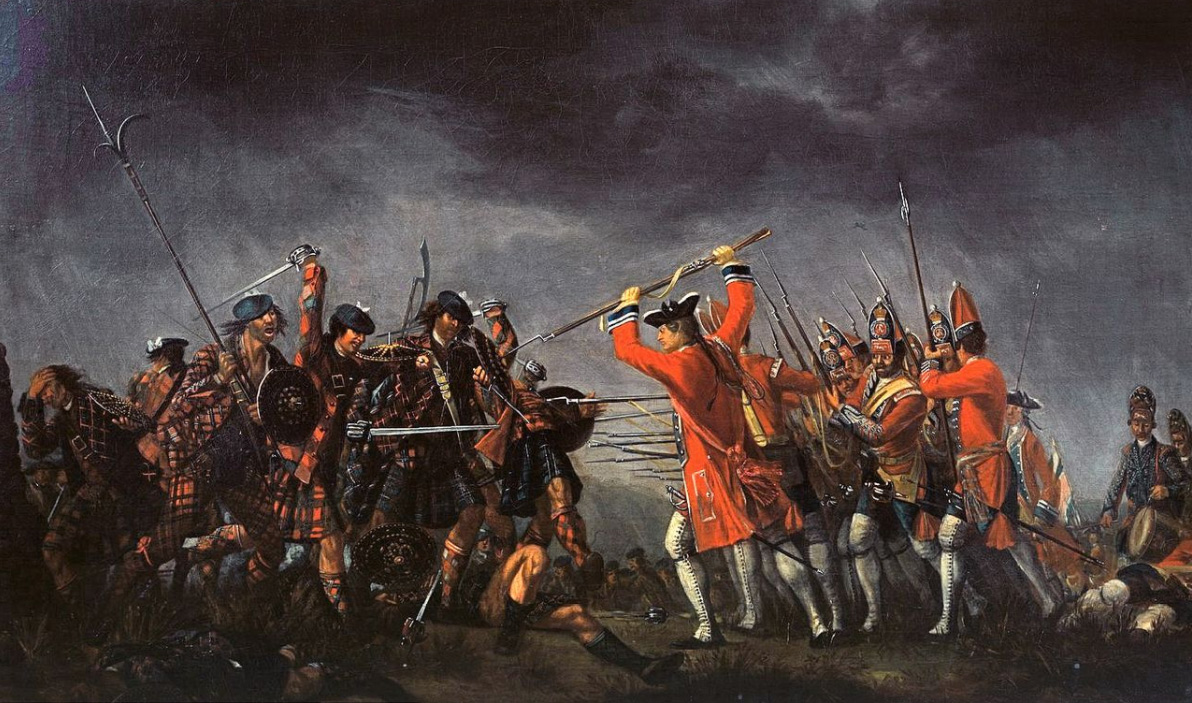
Wolfe served during the Jacobite Rising, where he fought at the decisive Battle of Culloden
Wolfe and his regiment were initially sent to Newcastle to bolster a force commanded by General Wade to prevent a Jacobite advance along the east coast. Instead the rebels bypassed Wade's army at Newcastle, by heading down the opposite coast via Carlisle. The Jacobites reached as far as Derby and only a force of militia stood between them and London. However, having encountered limited English support for their cause the Jacobites decided to withdraw and by the end of the year they were back in France and government forces prepared for what they believed would be a relatively easy campaign that would crush the rebels.
Wolfe served in Scotland in 1746 as aide-de-camp under General Henry Hawley in the campaign to defeat the Jacobite forces of Charles Edward Stuart. In this capacity, Wolfe participated in the Battle of Falkirk and the Battle of Culloden. At Culloden, he famously refused to shoot Charles Fraser, a wounded Highland soldier, when he was ordered by the Duke of Cumberland stating that he would rather resign his post than sacrifice his honour. However, the gesture did not work, and the man was shot by Cumberland himself. It has been suggested that it may have been Hawley who gave the order rather than Cumberland. This act may have been a cause for his later popularity among the Royal Highland Fusiliers, whom he would command in North America. After this he took part in the pacification of the Highlands, designed to destroy the remnants of the culture.
Return to the Continent
In January 1747 Wolfe returned to the Continent and the War of the Austrian Succession, serving under Sir John Mordaunt. The French had taken advantage of the absence of Cumberland's British troops and had made advances in the Austrian Netherlands including the capture of Brussels.
The major French objective in 1747 was to capture Maastricht considered the gateway to the Dutch Republic The Dutch Republic was a confederation that existed from 1579, during the Dutch Revolt, to 1795. It was a predecessor state of the Netherlands and the first fully independent Dutch nation state. Although the state was small and contained only around 1.5 million inhabitants, it controlled a worldwide network of seafaring trade routes. The income from this trade allowed the Dutch Republic to compete militarily against much larger countries. It amassed a huge fleet of 2,000 ships, initially larger than the fleets of England and France combined.. Wolfe was part of Cumberland's army, which marched to protect the city from the advancing French force under Marshal Saxe. On 2 July Wolfe participated in the Battle of Lauffeld,he was very badly wounded and received an official commendation for services to Britain. Lauffeld was the largest battle in terms of numbers in which Wolfe fought, with the combined strength of both armies totalling over 140,000. Following their narrow victory at Lauffeld, the French captured Maastricht and seized no more strategic fortress at Bergen-op-Zoom. Both sides remained poised for further offensives, but an armistice halted the fighting.
The Dutch Republic was a confederation that existed from 1579, during the Dutch Revolt, to 1795. It was a predecessor state of the Netherlands and the first fully independent Dutch nation state. Although the state was small and contained only around 1.5 million inhabitants, it controlled a worldwide network of seafaring trade routes. The income from this trade allowed the Dutch Republic to compete militarily against much larger countries. It amassed a huge fleet of 2,000 ships, initially larger than the fleets of England and France combined.. Wolfe was part of Cumberland's army, which marched to protect the city from the advancing French force under Marshal Saxe. On 2 July Wolfe participated in the Battle of Lauffeld,he was very badly wounded and received an official commendation for services to Britain. Lauffeld was the largest battle in terms of numbers in which Wolfe fought, with the combined strength of both armies totalling over 140,000. Following their narrow victory at Lauffeld, the French captured Maastricht and seized no more strategic fortress at Bergen-op-Zoom. Both sides remained poised for further offensives, but an armistice halted the fighting.
In 1748, at just 21 years of age and with service in seven campaigns, Wolfe returned to Britain following the Treaty of Aix-la-Chapelle which ended the war. Under the treaty, Britain and France had agreed to exchange all captured territory and the Austrian Netherlands were returned to Austrian control.
HISTORY
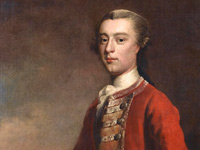
RESOURCES
This article uses material from the Wikipedia article "James Wolfe (1727-1759)", which is released under the Creative Commons Attribution-Share-Alike License 3.0.
© Stories Preschool. All Rights Reserved.
